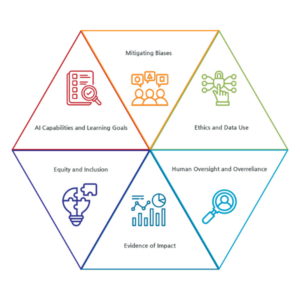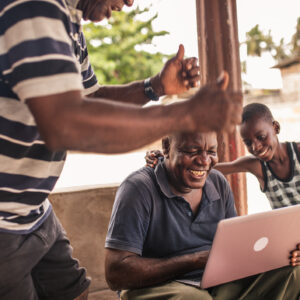
Drawing on decades of national leadership in the adult education and digital equity space, World Education has been engaging adult education leaders and providers, immigrant service providers, and federal and state offices this past year to ensure the Digital Equity Act of 2021 (DEA) will benefit adult learners. The overwhelming majority of adult learners belong to multiple Covered Populations prioritized under the Digital Equity Act, and adult education systems have the expertise, experience, and connections to help bridge the digital divide.
In response to the U.S. Department of Commerce’s National Telecommunications and Information Administration (NTIA) Request for Comments (RFC) on the DEA, which included twenty-four questions covering all three DEA grant programs and the evaluation of grantees and State Digital Equity Plans, World Education submitted the following recommendations:
- States should ensure that the public comment periods for their State Digital Equity Plan drafts are fully accessible to communities by providing communications and encouraging participation in a variety of formats (paper/mail, phone, online, in-person) and languages (plain language, languages other than English). States should also provide clear, accessible summaries of their State Digital Equity Plan and its goals and anticipated outcomes, including how the plans will benefit each of the Covered Populations and address their barriers to digital equity.
- States should commit to meaningful opportunities for engagement and partnerships with community stakeholders beyond the public comment period to allow for ongoing feedback, assessment, and recommendations regarding State Digital Equity Plan implementation and to ensure that implementation is responsive to the ever-evolving needs of Covered Populations.
- NTIA should provide guidance and resources to States on designing, implementing, and sustaining a robust digital equity ecosystem at the state and local levels to strengthen and sustain the impact of State Digital Equity Plans.
- NTIA should establish reporting requirements and methods for grantees that explicitly include soliciting and incorporating input from those most impacted by the digital divide. For example, grantees could provide regular progress reports that include input from community members, as well as a summary of how grantees solicited this input and responded to it.
- NTIA should consider moving towards a nationwide alignment of digital inclusion measures. To ensure equity for all individuals, however, this standardization should not solely involve standardized testing or only focus on employment or postsecondary enrollment. Reducing digital inclusion measures to standardized testing and employment and education-focused measures can disadvantage individuals from underrepresented and marginalized communities, who may have different needs, barriers, and priorities with regard to digital equity. Instead, it is important to consider the wide range of factors and indicators that are meaningful and relevant to the communities being served.
- To measure program effectiveness and effects for Covered Populations, there is a pressing need to address multiple data gaps, including 1) a need for guidance on the specific digital skill sets required for different Covered Populations and other demographics and 2) a lack of research on teaching and learning digital literacy with regard to different Covered Populations.
- To promote a baseline standard for digital literacy for all learners, NTIA should promote clear frameworks with defined skills progressions across different proficiency levels and around associated knowledge, skills, and attitudes. Furthermore, for any standards or frameworks promoted, NTIA should also provide guidance around addressing the differing skills, needs, and attitudes of different types of learners.
Read World Education’s full response to the Digital Equity Act RFC.
As a national leader in the adult education space, World Education infuses digital equity into all areas of our work, enabling everyone to thrive as learners, workers, and family and community members in the digital world. Learn more about our digital equity work.
This blog post was published as part of Transforming Immigrant Digital Equity (TIDE), a project of World Education. TIDE aims to serve adult immigrant and refugee English language learners equitably and holistically educating and engaging service providers, policy makers, institutional decision-makers, and advocates for re-envisioning adult education, digital equity, and immigration at the national, state, and local levels. Access TIDE’s DEA resources for adult education leaders, providers, and advocates, and contact Shirley Doan at shirley_doan@worlded.org if you are interested in engaging with us in DEA advocacy.




